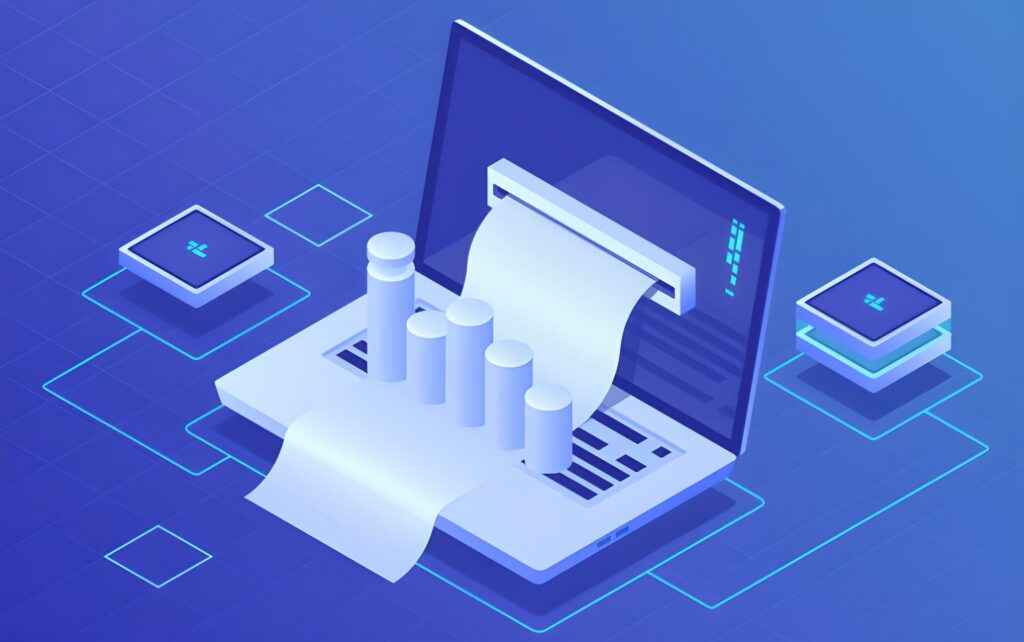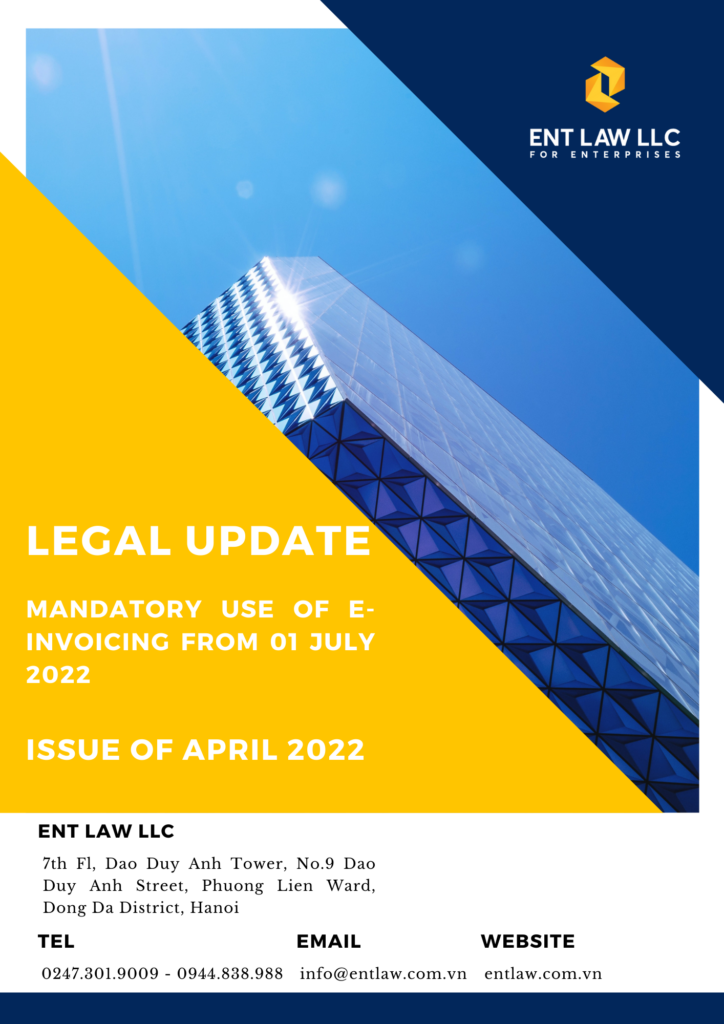Dear Valued Clients,
Using electronic invoices (“E-invoices”) is a mandatory requirement under Decree 123/2020/ND-CP (“Decree 123”) and Circular 78/2021/TT-BTC (“Circular 78”) that should be put on notice to enterprises. On February 24, 2022, the Ministry of Finance issued Decision No. 206/QD-BTC on the application of e-invoices in 57 provinces and central-run cities, effective from April 2022 for a number of eligible subjects. Subsequently, from July 1, 2022 going forward, all businesses are required to use e-invoices when buying and selling goods and services.
In this Legal Update, we would like to summarize the roadmap for mandatory use of e-invoices, procedures for converting paper invoices to e-invoices and sanctions for a number of violations in this regard.
Definition of E-invoice[1]
“E-invoice” means an invoice, with or without the tax authority’s authentication code, in the form of electronic data, issued by the goods seller or service provider through using electronic instruments to record information on the sale of goods or service provision in accordance with regulations of the law on accounting and the law on Taxation, including the invoices generated by POS cash registers that are digitally connected to tax authorities. To be specific:
- “Authenticated E-invoice” means an e-invoice that is granted an authentication code[2] by the tax authority before it is sent to the buyer by the goods seller or service provider.
- “Unauthenticated E-invoice” means an e-invoice that is sent to the buyer by the goods seller or service provider without the tax authority’s authentication code.
Roadmap to apply E-invoices
The mandatory use of E-invoices must comply with the regulations on E-invoices in the Law on Tax Administration 2019, Decree 123 and Circular 78. Decree 123 and Circular 78 shall both come into force from July 01, 2022. However, organizations and individuals that meet IT infrastructure requirements are encouraged to apply regulations on E-invoices and electronic records before July 01, 2022.
Accordingly, the application of E-invoices is implemented in 2 phases:
- Phase 1: From November 2021 to March 31, 2022: applied to 06 provinces and cities, including: Hanoi, Ho Chi Minh City, Quang Ninh, Binh Dinh, Phu Tho and Hai Phong[3];
- Phase 2: From April 1, 2022 to June 30, 2022: applied to the remaining 57 provinces and cities[4].
Except for cases specified in Article 14.1 of the Decree 123[5] where the household business or individual business does not carry out electronic transactions with tax authorities, does not have IT infrastructure, accounting software system or E-invoicing software enabling use of E-invoices and transfer of E-invoice data to buyers and tax authorities, paper invoices provided by tax authorities may be used within the maximum period of 12 months, and tax authorities shall adopt measures for facilitating their gradual use of E-invoices[6].
This maximum period of 12 months shall be count in a one-off manner commencing from July 01, 2022 if the household business or individual business starts their business before July 01, 2022, or the date of registration of use of invoices if the household business or individual business sets up businesses from July 01, 2022.
Procedures for applying E-invoices
Step 1: Determining whether your business is subject to the application of E-invoices with or without the tax authority’s authentication code[7].
Step 2: Filling form No. 01/DKTD-HDDT (issued together with Decree 123) and sending it to the tax authority to register the use of E-invoices.
Within 01 working day from receipt of the application for use of E-invoices, the tax authority shall send an electronic notice of approval or refusal of the application, prepared according to the form No. 01/TB-DKDT.
Step 3: Contacting organizations providing E-invoice solutions on the website of the General Department of Taxation according to Circular 78 to register and issue E-invoices.
Step 4: Terminating the use of E-invoices whose issue have been announced, and destroying any unused paper invoices whose issue have been announced (if any)[8].
Penalties for violations against regulations on the transfer of E-invoice data
According to Article 12.1 of Circular 78, in cases enterprises and taxpayers have not met IT infrastructure requirements yet to convert and use E-invoices under Decree 123, they may still use paper invoices or E-invoices according to previous regulations and send invoice data to the tax authority using form No. 03/DL-HDDT.
If an enterprise transfers E-invoice data to tax authority after expiry of the regulated time limit or transfers the summary report of electronic invoice data containing the inadequate number of invoices issued within invoicing periods or does not transfer electronic invoice data to tax authorities within the regulated time limit, it may be subject to penalties for violations against regulations on the transfer of E-invoice data according to Article 30 of Decree 125/2020/ND-CP as follows:
| Act of violation | Expired time |
Penalties range |
|
Transferring E-invoice data to tax authorities after expiry of the regulated time limit |
from 01 to 05 working days | 2,000,000 – 5,000,000 VND |
| from 06 to 10 working days | 5,000,000 – 8,000,000 VND | |
| at least 11 working days | 10,000,000 – 20,000,000 VND | |
| Transferring summary report of E-invoice data
containing the inadequate number of invoices issued within invoicing periods. |
5,000,000 – 8,000,000 VND | |
| Failing to transfer E-invoice data to tax authorities
within the regulated time limit. |
10,000,000 – 20,000,000 VND |
|
As always, we hope you find this article informative and helpful and look forward to working with you in the near future.
Kind regards,
ENT Law LLC
The full version of this Legal Update can be found here.
———————————–
[1] Article 3.2 of Decree 123.
[2] The authentication code on an E-invoice is a unique serial number generated by the tax authority’s system and a series of characters encoded by the tax authority based on the information specified by the seller on the invoice (Article 3.2(a) of Decree 123).
[3] In accordance with Decisions No. 1830/QD-BTC, No. 1832/QD BTC, No. 1831/QD-BTC, No. 1833/QD-BTC, No. 1838/QD-BTC, and No. 1839/ QD-BTC of the Ministry of Finance.
[4] Decision No. 206/QD-BTC dated February 24, 2022 on mandatory use of E-invoices in 57 provinces and central-run cities.
[5] Article 14.1 of Decree 123:
“Article 14. Provision of E-invoice services
The following entities are not required to pay service charges for a period of 12 months from the date of commencement of the use of authenticated e-invoices:
a) Small and medium-sized enterprises, cooperatives, household and individual businesses that operate in disadvantaged areas or extremely disadvantaged areas. Disadvantaged areas or extremely disadvantaged areas are defined in the List of areas eligible for investment incentives enclosed with the Government’s Decree No. 118/2015/ND-CP dated November 12, 2015 and its amending or superseding documents (if any).
b) Other small and medium-sized enterprises which are defined according to the requests of the provincial People’s Committees submitted to the Ministry of Finance, except enterprises operating in economic zones, industrial parks or hi-tech zones.”
[6] Article 11.2 of Circular 78.
[7] Article 91 of the Law on Tax Administration 2019 and Article 5 of Decree 123.
[8] The destruction of unused paper invoices must follow procedures provided in Article 27 of Decree 123.

 Tiếng Việt
Tiếng Việt



Issue of January 2026 – Decree No. 20/2026/ND-CP Guiding Resolution No. 198/2025/QH15 on the Development of the Private Economy
Dear Valued Clients, Decree No. 20/2026/ND-CP (“Decree 20”) was promulgated by the Government on January 15, 2026, providing...
Jan
RECRUITMENT ANNOUNCEMENT
Position Lawyer / Trainee Lawyer(Priority given to candidates who are currently enrolled in or have completed the Lawyer...
Jan
Issue of December 2025 – Amended Personal Income Tax Law
Dear Valued Clients, The National Assembly of Vietnam officially adopted the Fourth Draft of the Law on Personal...
Dec
ENT Law LLC at TECHFEST Vietnam 2025 – Hanoi
Dear Clients, Associates and Friends, ENT Law LLC is honored to take part in TECHFEST Vietnam 2025, the...
Dec